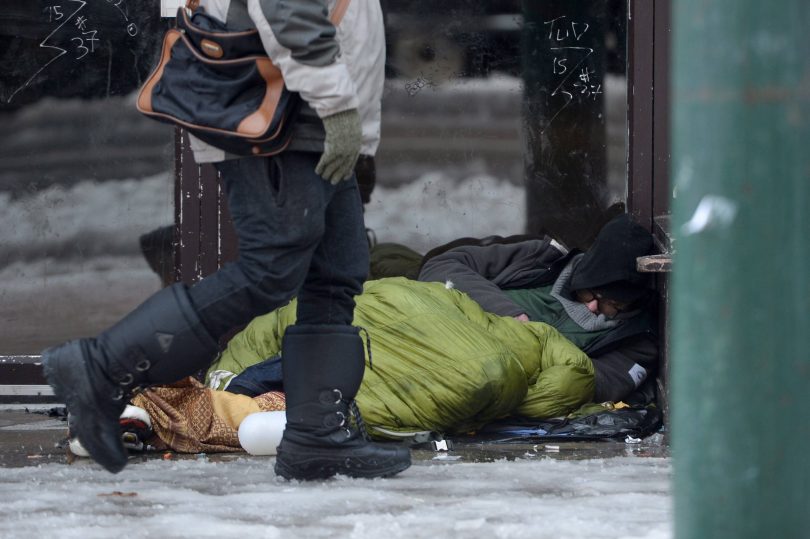A major snowfall in the Lower Mainland usually comes with plenty of public-service reminders to stay home if possible.
Yet for Vancouver’s more than 2,200 homeless people, having access to a warm, comfortable and safe shelter may not be an option. When temperatures plunge and the flakes start to fall, it’s all too common to see figures huddled in doorways or other spaces, trying to seek refuge from the icy, snowy weather.
Sometimes, winter can prove fatal for people without shelter.
There are many ways the public can help
While a lot of people may simply pass by a homeless person in a cold snap, some want to help – but are unsure exactly how.

Mei Lai, co-ordinator at Providence Health Care’s Crosstown Clinic, says there is plenty you can do if you see someone you believe needs urgent help in the cold and snow.
Specific things you can do
When you first approach a homeless person in need of support, try to avoid touching or shaking them. That may startle them.
Instead, say loudly, “Excuse me (sir or ma’am),” and gently assess how they are. Are they bundled up, or do they appear to have passed out without any covering?
Often 911 is your best option
If they appear unconscious, severely ill/injured or unresponsive, call 911. If they are conscious, it is best to ask if they’d like help. Some may turn it down as they’re afraid of the hospital or ambulance, and may act unpredictably. If this happens, you can alert community services such as Union Gospel Mission for help. Be mindful that organizations in the Downtown Eastside may serve specific areas only, however.
If the person you approach does respond, it’s good to ask what they need and let them tell you. Is it medical help? A shelter? Don’t assume they will automatically need something, and try to respect their wishes.
If the person is acting erratically, it’s wise to use a lot of caution if you approach them, as their reaction could be unpredictable. Sometimes it’s best to call an ambulance and allow someone who is highly trained in the situation to handle it best.
If you decide to approach them, give them a lot of space and keep an eye out for ways to leave the situation if it heats up. Avoid what could be perceived as threatening body language like moving your hands or arms fast, or speaking in loud, aggressive tones.
Have some city resources on hand
If the person you approach seems open to you and your offer of help, you may wish to give them information about community resources like city warming centres. They may also be aware of specific resources. Use your mobile phone to Google information for them. You can also check the 211 phone resource that provides shelter information for Metro Vancouver.

Some members of the public like to providefood. Again, it’s often helpful to check with the individual. Some people may not have teeth, or are limited by allergies.
Blankets and other items like socks, boots or cards for places that provide hot food can be useful and greatly appreciated. You may even wish to provide cash. That is totally up to you.
Despite the best intentions, some people may not want charity, so be mindful of that and don’t take it personally.
It may be frustrating if you’ve offered to help a person but see them on the street in the same place every day. Some homeless people stay in a specific area because they find the familiarity comforting and may not want to venture elsewhere for safety reasons. Others may know that they can get food or change from passers-by in certain areas.
When a homeless person refuses an offer of shelter
A big question we often hear is: why don’t people without homes go to a shelter?
It’s complicated.
Some have limits on the amount of time a person can stay, as there’s a high need for beds.
Others pose barriers. For instance, there may be gender restrictions that force couples to separate in order to get shelter. Couples and families may stay together and forfeit shelter beds so they can support and protect one another.
Still others may have had bad experiences in shelters including bullying or theft of their personal items, and don’t feel safe. While shelters help a lot of homeless, the reality is that they can’t assist all vulnerable individuals. These are the ones who especially benefit from other kinds of support.
Your gesture of kindness could save a life
Every homeless person has their own story to tell. There is a lot more to them than meets the eye.
And for the most part, your kindness and compassion will be a huge help. It may lead to longer-term care or even save a life.






Awesome advice and suggestions Mei! Glad to see we are bringing awareness of this issue.